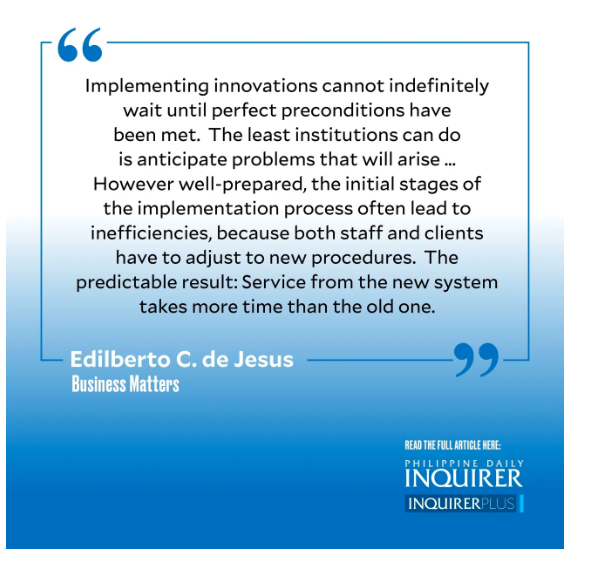Changing systems

The Bureau of Internal Revenue (BIR) offered welcome, timely support to current government efforts at “right-sizing” bureaucracy to improve public service. It announced that taxpayers can now file and pay their taxes in any accredited bank or collection office. Previous rules imposed penalties on taxpayers making payments outside the BIR districts where they were registered. This new system deserves close attention from the public, as it also requires more information and assistance from BIR.
The announcement that taxpayers are now “mandated” to use the BIR’s electronic filing and paying system (eFPS) requires clarification. From the news report, it seems that neither the eFPS service nor the eFPS forms are universally available, with the deadline for payments not even a month away. The “mandatory” nature of the eFPS thus becomes problematic. How can it be reasonably enforced and who will determine permissible exemptions? This case illustrates the kind of issues that right-sizing programs commonly face.
Technology allows dramatic improvements in cost-saving efficiencies—but only with necessary preconditions in place. This was surely something we learned from the effort to exploit the potential of online learning during the pandemic season. Presumed educational benefits depended on multiple elements seamlessly interlocking: 1) adequate capacity and standard reliability of the internet infrastructure; 2) teacher and student access to devices and internet services; 3) availability of appropriate learning materials; 4) teachers and students prepared for online instruction; 5) family support for distance education.
Significant failure in any of the parts would seriously compromise the effectiveness of the entire system. Since the eFPS also requires coordination with participating banks and possibly also the taxpayers’ employers, private sector systems must ensure comparable conditions for the capacity and resilience of their own systems. These also face similar limitations. We have become all too familiar with corporate online platforms that remain unresponsive, simply wasting customer time or send serial, automated replies apologizing, sometimes with an emoticon, for their limited capacity to meet consumer demand.
Implementing innovations cannot indefinitely wait until perfect preconditions have been met. The least institutions can do is anticipate problems that will arise. As military experts warn about combat, the first skirmish can disrupt all carefully plotted plans. However well-prepared, the initial stages of the implementation process often lead to inefficiencies, because both staff and clients have to adjust to new procedures. The predictable result: Service from the new system takes more time than the old one.
BIR is introducing the online processes that health and social security agencies have adopted. Immigration and other agencies in the airport are following suit. They should learn from the experience of the pioneers, which are still dealing with the problems of system change.
Shifting to online processes often add a new source of customer fury and frustration. Technology can mask institutional inefficiencies coming from technical issues or poor personnel training. Customers with their smartphones or computers are completely helpless when their devices don’t respond. They do not even get the release that comes from complaining to the service people, who are shielded by the technology and blissfully unbothered by the problems at the consumer end. This is actually only a more advanced and more costly technological failure of the phone that keeps disconnecting or ringing—because no one is available at the other end to answer the call.
These inefficiencies have a “democratizing” aspect. They affect everyone; the education, social status, bank account of the person on the other end of the phone or internet link is irrelevant. But this would be true only in the short term. As usual, the cost of inefficiencies will place a heavier burden on the poorer classes, starting with those with less bandwidth, apps, and credit on their phones.
The private sector has the option of choosing which market segments to pursue; they are still accountable to deliver on their commitments. Too many companies behave like they are too big to fail. In dealing with the private sector, customers can decide, as a last resort, to discontinue services that they are paying for but are not getting. But what is the recourse when the other party is a government agency—whose services are legally required and whose bureaucracy is better protected from their own inefficiencies?
——————–
Edilberto C. de Jesus is professor emeritus at the Asian Institute of Management.
Disclaimer: The comments uploaded on this site do not necessarily represent or reflect the views of management and owner of Cebudailynews. We reserve the right to exclude comments that we deem to be inconsistent with our editorial standards.
